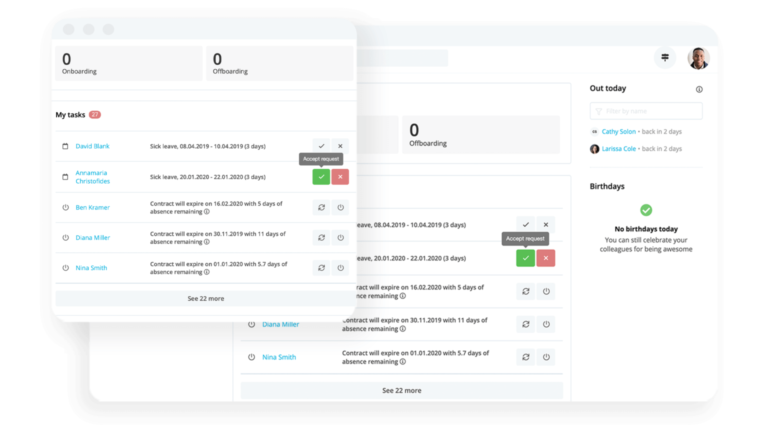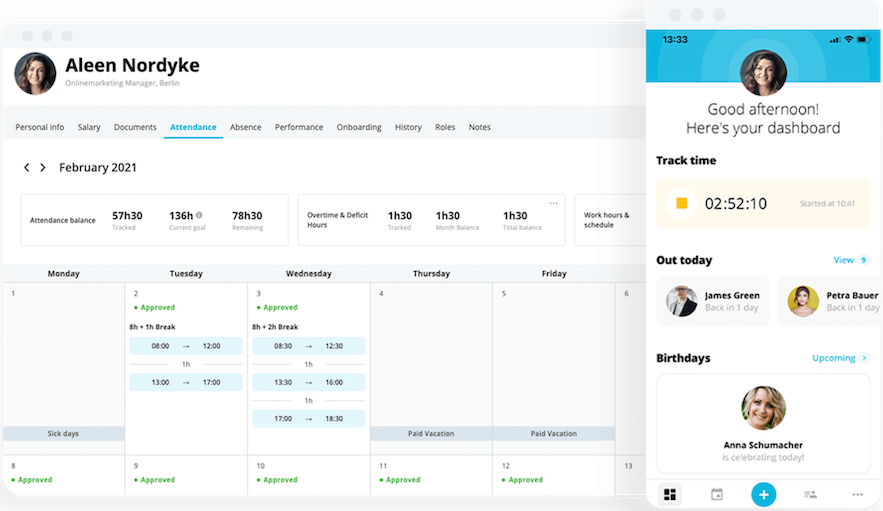People Managers & Their Role in People Management
In this article, we’ll discuss the vital role that people managers play within an organisation, including their key focus areas and some of the skills the job requires. We’ll also consider the actions that HR can take to support their organisation’s people managers and set them up for success.
Start from the top with our performance review template today.What Is People Management?
People management is a subset of human resource management that focuses (as the name suggests) on people. Its purpose is to help organisations to maximise results by increasing their employees’ productivity and improving overall performance.
This means that people management encompasses everything from sourcing, hiring and onboarding the right talent through to training, developing and evaluating existing employees.
Another key focus is improving employee engagement and motivation since this can have a huge impact on productivity — and ultimately the company's bottom line.
The purpose of people management is to ensure that employees have a positive experience of working for their employer, and that their skills and talents are used to their full potential.
What Is a People Manager?
A people manager (or people operations manager) is a professional who works within people management. Usually, people managers sit within the company’s HR department and work closely with other HR professionals.
Their role is to help their company to get the most out of its talent. Large organisations might have an entire people operations team, while smaller ones manage with just one or two people managers.
Other organisations may not have dedicated people managers at all. Instead, members of their HR team perform some people management duties alongside other more traditional HR tasks (like managing payroll or maintaining employee records, for example).
Are People Managers the Same as HR Managers?
Properly speaking, people management is just one function that sits under the wider human resource management umbrella. People management tends to focus on strategies for employee engagement, wellness and increasing productivity — in other words, everything that relates to people. HR, on the other hand, is often concerned with legal or compliance issues, internal processes and the structure of the organisation.
In practice, however, the terms “people” and “HR” are often used interchangeably in job descriptions and within organisations. Exactly how each term is used depends on the company in question. In this article, we’ll be treating people management as a specific role that’s distinct from the duties of an HR generalist.
What Are the Main Responsibilities of a People Manager?
Here are some of the key focuses that people managers might be concerned with.
Recruiting, Hiring and Onboarding New Employees
People managers play a role in sourcing and hiring new employees for their organisation. And not just any new employees: their job is to find the right people to drive organisational success.
That might mean helping hiring managers to create and distribute effective job ads, getting involved with the interview process, and designing and delivering onboarding programmes that get new hires up to productivity as quickly as possible.
Leading Training Programmes and Championing Employee Development
A people manager’s role is to ensure that every employee delivers as much value as possible for the organisation. And a big part of that is ensuring that everyone has access to the learning and development opportunities they need to do their best work.
People managers might spend time surveying employees to find out what learning opportunities they would most benefit from, or even building a business case for investing in a self-service learning platform.
This not only helps employees to feel more confident and do better work, but it can boost the company's bottom line too: a recent study found that companies with formalised learning programmes saw profit margins that were 24% higher than those without.
Analysing and Assessing Employee Performance
People managers are employed to improve performance across the organisation. This means that they need to have a keen understanding of how every employee is performing, and what improvements will look like.
In many organisations, they carry out regular performance reviews and appraisals. They may also use various tools to help them track employee performance, set goals and drive the company forward.
Problem-Solving and Handling Conflicts Between Employees
While people managers should encourage positive relationships between employees, sometimes things go wrong. And in these situations, people managers need to be prepared to step in and mediate conflicts. A good people manager should be able to solve problems in a helpful and productive way that leaves everyone feeling supported and listened to.
Improving Employee Engagement and Motivation
According to a 20216 Gallup study, engaged teams are 17% more productive than disengaged teams, and generate 21% more profit for the company. Because of this, boosting employee engagement and motivation is a large part of a people manager’s role.
There are many different ways to do this, but one of the most important things a people manager can do is to work to create a culture of clear and open communication. Delivering regular, targeted praise can also be key to keeping employees motivated, and looking after employees’ wellness and work-life balance can go a long way too.
15,000 organisations trust Personio for this reason

Just like LUSH and Premier Inn, trust Personio's all-in-one HRIS to upgrade your people operations for now and into the future. Click below to learn more about us.
Book Your DemoWhat Makes For a Good People Manager?
While it’s possible to pick up people management skills through training and experience, there are certain attributes that are common among strong people managers. Here are some of the key skills and competencies that they often share:
Empathy: People management involves listening to other people’s points of view and thought processes, which requires empathy and understanding.
Communication: Almost everything a people manager does involves communicating in one form or another. The best people managers are able to do this in a way that’s clear, open and direct.
Mediation: People managers occasionally need to manage conflicts between employees, so skills in calm and productive mediation are essential.
Active listening: A good people manager should be skilled at making people feel heard. This often means showing the speaker that you are paying attention with active listening techniques.
Organisation: People management typically involves a lot of different tasks and may mean working with a variety of colleagues and stakeholders across the organisation. Strong organisational skills allow people managers to keep track of everything.
How Can Organisations and HR Best Support People Managers?
People management and HR teams often have overlapping objectives in terms of things like employee retention, team performance and productivity. And since HR is at the very core of an organisation, they’re in a great position to help people managers to achieve their goals.
Here are three ways that HR teams can support their organisation’s people managers and give them the best chances of success:
1. Provide the Right Training Opportunities
While there are some innate skills that good people managers tend to share, it is possible to learn to be an effective people manager. And HR often acts as the gatekeeper for employee training.
This means that one of the biggest ways they can help people managers is to ensure they have access to the right training and development opportunities. For example, training that helps people to better manage conflict or inspire other employees could be beneficial to new or inexperienced people managers.
2. Work Together to Set Clear Strategic Goals
Everything that a people manager does should ultimately be about helping the company to achieve its overall goals through people management initiatives. And in most organisations, HR plays a key role in promoting the company’s strategy and helping employees to understand it.
This means that HR teams are in a good position to help people managers set appropriate goals and targets. By working with people managers on this, HR can ensure that people managers are working towards objectives that will move the organisation forward.
3. Provide the Right Tools to Streamline People Management Tasks
In an ideal world, people management would be all about people. But in reality, people managers usually have a certain number of administrative tasks that they need to complete as well. For example, reviewing and assessing employees’ performance is a key part of a people manager’s role — but scheduling meetings, following up and writing up goals and objectives can take up a lot of time.
That’s why it’s crucial for HR teams to ensure people managers have access to the tools they need to automate and simplify repetitive tasks, giving them back the time they need to focus on people, not processes.
Introducing Personio
Personio comes with all the tools your people managers need to streamline mundane HR tasks so they can get back to what they do best.
For example, Personio’s automated onboarding process allows new hires to be productive from day one, without people managers needing to send manual reminders or follow up on tasks.
You can use Personio to set up performance cycles to automate the performance review process and keep track of progress across your organisation. And Personio can also help you to manage training programmes, source the best applicants, and keep track of employee data in their digital files.
Want to learn more? Sign up for a free demo to see Personio in action.

